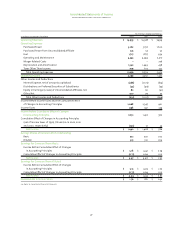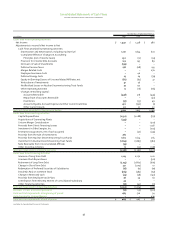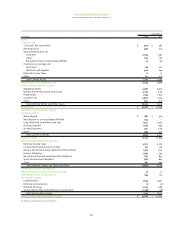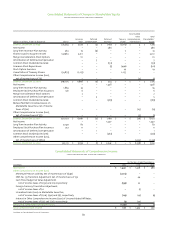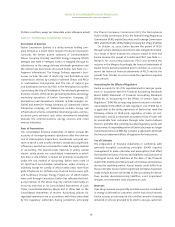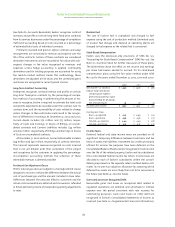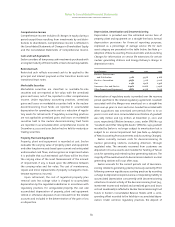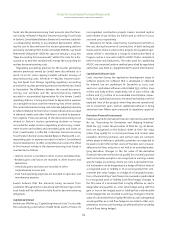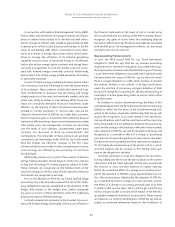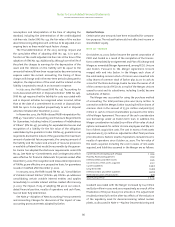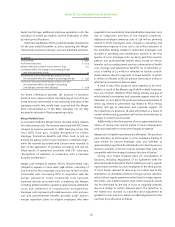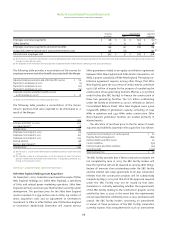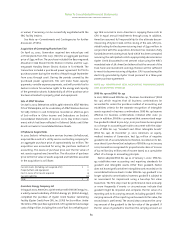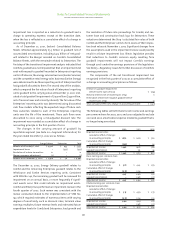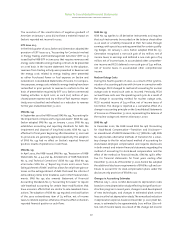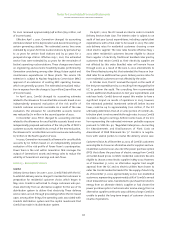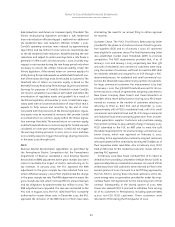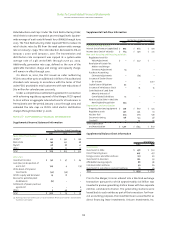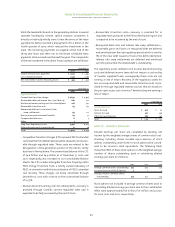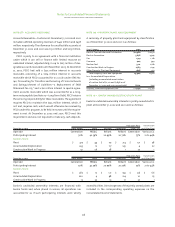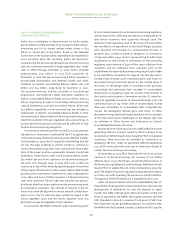ComEd 2002 Annual Report Download - page 89
Download and view the complete annual report
Please find page 89 of the 2002 ComEd annual report below. You can navigate through the pages in the report by either clicking on the pages listed below, or by using the keyword search tool below to find specific information within the annual report.
Spent Fuel Storage, additional employee separation costs, the
resolution of certain tax matters and the finalization of other
purchase price allocations.
Selected unaudited pro forma combined results of operations
for the year ended December 31, 2000, assuming the Merger
Transaction occurred on January 1,2000 are presented as follows:
(unaudited) 2000
Total revenues $ 13,531
Pro forma net income $ 1,003
Merger-related costs (net of income taxes of $147) 220
Cumulative effect of a change in accounting principle
(net of income taxes of $16) 24
Pro forma net income before Merger-related costs and
the cumulative effect of a change in accounting principle $ 1,247
Pro forma net income before Merger-related costs and
the cumulative effect of a change in accounting
principle per common share (diluted) $ 3.86
Pro forma information assumes the issuance of transition
bonds in 2000 had occurred at the beginning of 2000.The pro
forma financial information is not necessarily indicative of the
operating results that would have occurred had the Merger
been consummated as of the dates indicated, nor are they
necessarily indicative of future operating results.
Merger-Related Costs
In association with the Merger,Exelon recorded certain reserves
for restructuring costs.The reserves associated with PECO were
charged to expense pursuant to FASB Emerging Issues Task
Force (EITF) Issue 94-3, “Liability Recognition for Certain
Employee Termination Benefits and Other Costs to Exit an
Activity (including Certain Costs Incurred in a Restructuring)”;
while the reserves associated with Unicom were recorded as
part of the application of purchase accounting and did not
affect results of operations, consistent with EITF Issue 95-3,
“Recognition of Liabilities in Connection with a Purchase
Business Combination.”
Merger costs charged to expense. PECO’s merger-related costs
charged to expense in 2000 were $248 million, consisting of
$116 million for PECO employee costs and $132 million of direct
incremental costs incurred by PECO in conjunction with the
merger transaction. Direct incremental costs represent
expenses directly associated with completing the Merger,
including professional fees, regulatory approval and settlement
costs, and settlement of compensation arrangements.
Employee costs represent estimated severance costs and pen-
sion and postretirement benefits provided under Exelon’s
merger separation plans for eligible employees who were
expected to be involuntarily terminated before December 2002
due to integration activities of the merged companies.
Additional employee severance costs of $48 million, primarily
related to PECO employees, were charged to operating and
maintenance expense in 2001, and a $10 million reduction in
the estimated liability related to Generation employees was
recorded in operating and maintenance expense in the first
quarter of 2002. Employee costs are being paid from Exelon’s
pension and postretirement benefit plans, except for certain
benefits such as outplacement services, continuation of health
care coverage and educational benefits. As of December 31,
2002, a liability of $4 million is reflected on Exelon’s consoli-
dated balance sheet for payment of these benefits, of which
$1 million is reflected on PECO’s balance sheet and $1 million is
reflected on Generation’s balance sheet.
A total of 960 PECO positions were expected to be elimi-
nated as a result of the Merger, 274 of which related to genera-
tion, 230 of which related to PECO energy delivery and 456 of
which related to enterprises and corporate support areas. As of
December 31, 2002,858 of the positions had been eliminated, of
which 224 related to generation, 195 related to PECO energy
delivery, and 439 to enterprises and corporate support. Of
the remaining 102 positions, 58 were eliminated as a result of
normal attrition and 44 positions will not be eliminated due to
changes in certain business plans.
Additionally,in the third quarter of 2000,approximately $20
million of closing costs and $8 million of stock compensation
costs associated with Unicom were charged to expense.
Merger costs included in purchase price allocation.The purchase
price allocation as of December 31, 2000 included a liability of
$307 million for Unicom employee costs and liabilities of
approximately $39 million for estimated costs of exiting various
business activities of former Unicom activities that were not
compatible with the strategic business direction of Exelon.
During 2001, Exelon finalized plans for consolidation of
functions, including negotiation of an agreement with the
International Brotherhood of Electrical Workers Local 15 regard-
ing severance benefits to union employees. In the third quarter
of 2002, Exelon reduced its reserve by $12 million due to the
elimination of identified positions through normal attrition,
which did not require payments under Exelon’s merger separa-
tion plans, and a determination that certain positions would
not be eliminated by the end of 2002, as originally planned,
due to a change in certain business plans. The reduction in
the reserve was recorded as a purchase price adjustment to
goodwill. In 2001 and 2002, Exelon recorded adjustments to the
purchase price allocation as follows:
Notes To Consolidated Financial Statements
exelon corporation and subsidiary companies
87


